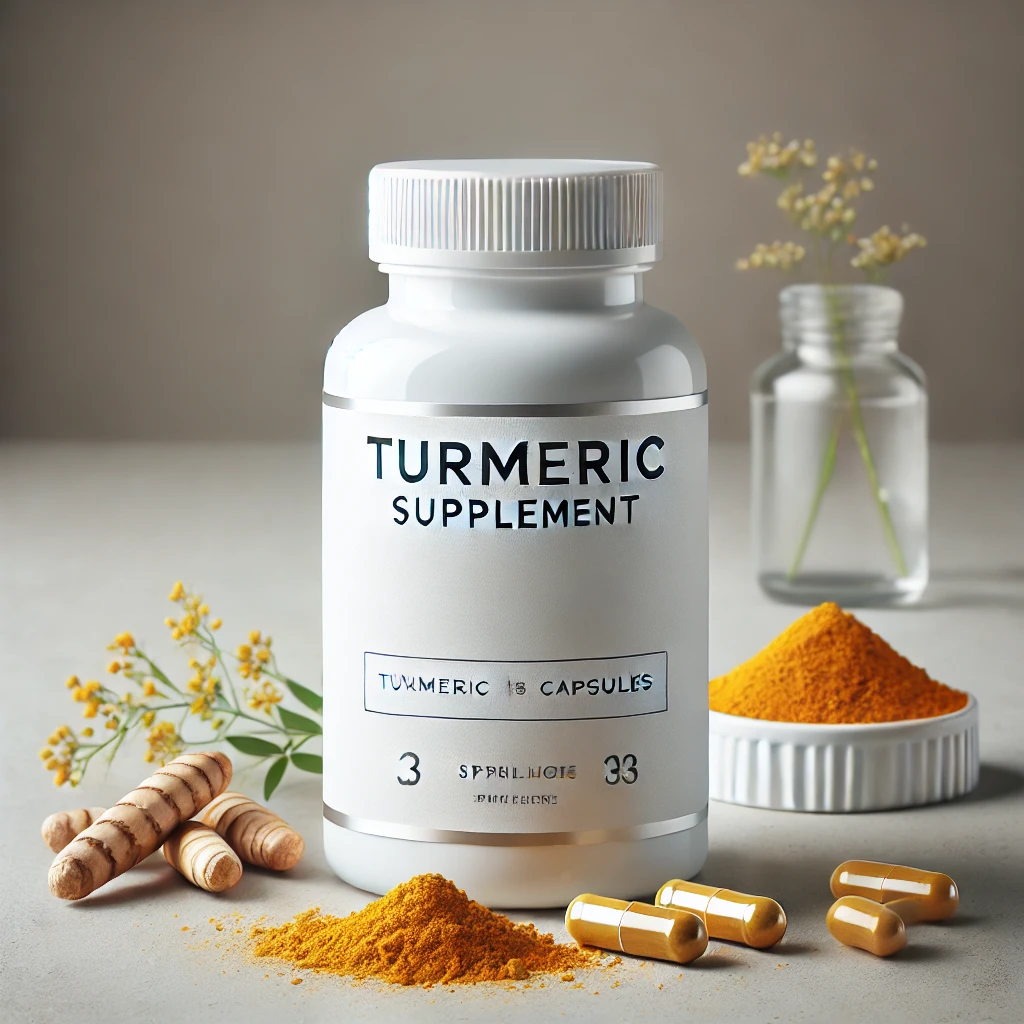If you’ve ever spent the night staring at the ceiling, willing yourself to fall asleep, you know how exhausting the next day can be. But what if the secret to better sleep was already in your kitchen cabinet? In this guide, you’ll learn how to use turmeric for sleep—a golden spice praised for its powerful health benefits. Recent research shows it may help reduce inflammation and regulate stress hormones, allowing your body to unwind and your mind to quiet down. The result? A better chance to drift into deep, restful sleep.
How Does Turmeric Impact Sleep?

1. Curcumin and Its Effect on the Brain
Think of curcumin—the powerhouse compound in turmeric—as a nighttime brain reset button. It doesn’t just sit there looking pretty; it actively works to balance your brain chemistry for better, deeper sleep.
Here’s how:
- Lowers cortisol (the stress hormone)→ Too much cortisol = wired but tired. Curcumin helps bring it down so your brain knows it’s time to unwind.
- Increases serotonin and dopamine—two key mood boosters. More serotonin also means more melatonin for deeper sleep.
- Reduces oxidative stress & inflammation→ Ever wake up feeling exhausted even after a full night’s sleep? Chronic inflammation could be wrecking your rest. Curcumin helps by clearing out inflammation-linked disruptions in your brain.
What does this all mean? Turmeric isn’t a knockout pill, but it optimizes your brain for quality, uninterrupted sleep. Pair it with the right habits, and you’ve got a natural sleep-support system working for you.
2. Turmeric’s Role in Anxiety and Stress Reduction
Stress and sleep are like two kids fighting over a toy—one wins, and the other suffers. If stress takes over, sleep pays the price.
Here’s where turmeric shines:
It’s been shown to reduce anxiety and symptoms of depression by balancing neurotransmitters.
Studies suggest it may even increase BDNF (Brain-Derived Neurotrophic Factor), a protein that helps your brain adapt to stress better—so those late-night worries don’t keep you awake.
Translation? A less stressed brain is a sleepier brain.
3. Does Turmeric Contain Sleep-Inducing Compounds?
If you’re expecting turmeric to knock you out like chamomile or valerian root, you might be disappointed. It’s not a sedative.
But here’s what it does do:
- Reduces inflammation (which can interfere with deep sleep).
- Balances stress hormones, making it easier to relax.
- Supports gut health, which is surprisingly linked to better sleep.
Pro tip: Turmeric works even better when paired with other sleep-friendly ingredients—like warm milk (which contains tryptophan), honey, or cinnamon.
How to Use Turmeric for Sleep Relief: Tea, Supplements, and Meal Ideas
1. Turmeric Tea Recipe for Sleep : The Golden Milk Ritual
You know that feeling when you curl up with a warm drink and instantly feel at ease? That’s the magic of Golden Milk—but this isn’t just any bedtime drink. It’s a centuries-old Ayurvedic sleep tonic, crafted to calm your nervous system and set the stage for deep, uninterrupted rest.
The secret? Turmeric. This golden spice isn’t just for curries—it’s packed with anti-inflammatory and stress-reducing properties that may help you drift off faster and wake up feeling refreshed.

Simple Golden Milk Recipe for Sleep
- 1 cup warm milk (dairy or plant-based—almond or coconut work great)
- ½ teaspoon turmeric (the golden star)
- A pinch of black pepper (activates curcumin for max benefits)
– Optional: Honey or cinnamon for extra relaxation and taste
Why It Works
- Warm milk contains tryptophan, which boosts melatonin (your sleep hormone).
- Turmeric fights inflammation and stress, so your body can relax instead of staying in fight-or-flight mode.
- Black pepper supercharges turmeric absorption**, making sure your body actually uses it.
🕒 When to Drink It? About 30–60 minutes before bed. Give your body time to soak up the benefits, and let the relaxation kick in.
💡 Pro Tip:Turn it into a bedtime ritual—your brain will start associating it with sleep, making it even more effective.
Related Post: Can’t Sleep? These 7 Herbal Teas Might Be All You Need
2. Turmeric Supplements for Sleep: Are They Effective?

Maybe you’re not a fan of turmeric tea, or you just want a no-fuss way to get the benefits. That’s where turmeric supplements come in. But are they as effective as the real thing?
Capsules vs. Fresh or Powdered Turmeric—Which Wins?
– Fresh or powdered turmeric gives you the full spectrum of benefits, plus a little ritual in your routine.
– Capsules deliver a concentrated dose of curcumin, the active compound—but there’s a catch: curcumin isn’t easily absorbed on its own.
The Secret Ingredient? Piperine.
If you’re going the supplement route, don’t skip piperine (a compound found in black pepper). Studies show it boosts curcumin absorption by up to 2,000%. Look for a supplement that lists black pepper extract (or piperine) to make sure you’re actually getting the benefits.
Who Should Consider Supplements?
- If you don’t like the taste of turmeric but still want the benefits.
- If you need ahigher, consistent dose for inflammation relief.
- If you travel often and want an on-the-go option.
If you take turmeric supplements, have them with a meal that contains healthy fats (avocado, nuts, olive oil). Fat helps your body absorb curcumin better, making the supplement work more effectively.
3. Cooking with Turmeric for Better Sleep: Easy Ways to Add It to Your Dinner

What if you could boost your sleep quality just by tweaking your dinner? Turns out, adding turmeric to your evening meals might be the simplest sleep hack yet.
Easy Ways to Add Turmeric to Dinner
- Stir it into soups, stews, or curries for a cozy, anti-inflammatory boost.
- Sprinkle it into roasted veggies or blend it into a creamy dressing.
- Add a pinch to rice or quinoa for a subtle golden glow.
The Key to Maximum Absorption? Healthy Fats.
Turmeric is fat-soluble, meaning your body absorbs it best when paired with healthy fats like:
✅ Coconut oil (perfect for curries and roasted veggies)
✅ Ghee (adds a rich, buttery depth)
✅ Avocado (blend it into dressings or top your meal with slices)
4. Combining Turmeric with Other Sleep-Friendly Ingredients
Turmeric is powerful on its own, but when you pair it with the right ingredients, it turns into a next-level sleep booster. Think of it like stacking the deck in your favor—combining compounds that work synergistically to help you relax, unwind, and drift into deep sleep.
Turmeric + Ashwagandha: The Stress-Melting Duo
Ashwagandha is an adaptogenic herb known for lowering cortisol levels (your stress hormone). Pairing it with turmeric creates a powerhouse combo that calms the nervous system and eases anxiety-related sleep issues.
👉 Stir a pinch of ashwagandha powder into your golden milk or take it as a supplement alongside your turmeric.
Turmeric + Magnesium: Muscle Relaxation & Deeper Sleep
Magnesium is like a natural tranquilizer—it relaxes muscles, calms the mind, and supports melatonin production. If stress, muscle tension, or restless legs keep you up at night, this combo is worth trying.
👉 Add turmeric to a bedtime smoothie with magnesium-rich foods like banana and almond butter. Or, take a magnesium glycinate supplement with your turmeric tea.
Turmeric + Tart Cherry Juice: A Natural Melatonin Boost
Tart cherries are one of the best natural sources of melatonin, the hormone that signals your body it’s time to sleep. When paired with turmeric’s anti-inflammatory effects, it helps promote a deeper, more restorative sleep cycle.
👉 Mix a splash of tart cherry juice into warm turmeric tea or sip it separately 30 minutes before bed.
These combos work best when used consistently—try them for at least a week and pay attention to how your sleep improves.
Beyond Sleep: Other Health Benefits of Turmeric

Turmeric isn’t just great for improving sleep—it offers a variety of health benefits that can make a real difference in your overall well-being. Let’s take a look at some of the ways turmeric can support your health beyond just sleep:
1. Anti-Inflammatory and Pain Relief
One of the most well-known benefits of turmeric is its anti-inflammatory properties. It helps to reduce joint pain, muscle soreness, and chronic inflammation by blocking certain enzymes and proteins that contribute to swelling. This makes turmeric a go-to remedy for people dealing with conditions like arthritis, sports injuries, or general aches and pains.
If you’re an athlete, arthritis sufferer, or someone who struggles with chronic pain, incorporating turmeric into your diet might just offer some relief. Whether it’s through a daily cup of turmeric tea or turmeric supplements, the compound curcumin found in turmeric is a powerful ally in managing discomfort.
2. Gut Health and Digestion
– Turmeric is also great for your gut health. It helps maintain a healthy gut microbiome by promoting the growth of beneficial bacteria and reducing the number of harmful bacteria. For those who experience bloating or indigestion, turmeric can be a gentle, natural remedy.
A study in the Journal of Clinical Gastroenterology highlights turmeric’s role in supporting gut health and alleviating digestive issues like bloating and indigestion (NCBI – National Library of Medicine).
Drinking turmeric tea before bed may not only help you relax but also aid digestion overnight, allowing your digestive system to function more smoothly as you sleep. If you’re prone to digestive discomfort, adding turmeric into your evening routine could give your gut a well-needed boost.
3. Immune System Boost
Another fantastic benefit of turmeric is its ability to boost the immune system. Thanks to its antioxidant and anti-inflammatory properties, turmeric helps fight infections, colds, and flu. It can help strengthen your body’s defense system by supporting the function of white blood cells that combat pathogens.
In many traditional medicine practices, turmeric has long been used as a natural remedy for boosting immunity. So if you’re looking for a way to keep your immune system strong year-round, turmeric is a natural and effective choice.
Related : How Sleep Affects Your Immune System
Potential Side Effects and Who Should Avoid Turmeric
While turmeric offers many health benefits, it’s important to be mindful of potential side effects and know who should avoid it or use it with caution.
1. Can Too Much Turmeric Cause Problems?
Like with anything, moderation is key. While turmeric is generally safe, overuse can lead to stomach irritation, acid reflux, or digestive issues. If you take too much turmeric, it might cause discomfort or an upset stomach, especially for those with sensitive digestive systems.
Tip: Start small and see how your body reacts, gradually increasing your intake if needed.
Turmeric is not recommended for people with gallbladder issues or blood clotting disorders, as it may interfere with bile production or blood clotting mechanisms.
2. Turmeric and Medication Interactions
While turmeric is a natural remedy, it can interact with certain medications, including blood thinners, diabetes medications, and certain antidepressants. If you’re on any medication that affects blood clotting or blood sugar levels, or if you’re taking antidepressants, it’s best to talk to your doctor before introducing turmeric into your routine.
Always consult a healthcare professional to avoid any negative interactions.
3. Is Turmeric Safe for Everyone?
Turmeric is generally considered safe for most people, but there are some exceptions. If you’re pregnant or breastfeeding, you should avoid high doses of turmeric. While small amounts in food are fine, high doses or supplements could pose risks.
Can children consume turmeric? Yes, in small, food-based amounts, turmeric is safe for children, but supplements or larger quantities should be avoided unless recommended by a pediatrician.
Safe dosages for different groups: If you’re in a vulnerable group—such as pregnant women, children, or those with certain health conditions—it’s always best to check with your doctor for guidance on the appropriate dosage.
Final Thoughts:
As we’ve explored, turmeric isn’t a magic sleep solution, but it can certainly help improve your sleep indirectly. By reducing stress and inflammation, it creates a more relaxed environment for your body to rest. Whether you’re dealing with anxiety, chronic pain, or inflammation, turmeric might offer a calming, natural remedy.
So, how can you add turmeric to your routine? You’ve got options! One of the best ways is by sipping golden milk before bed. You can also sprinkle it into your cooking, or opt for a supplement if that’s more your style.
Have you ever used turmeric to tackle a health issue or symptom? Whether it’s sleep problems, inflammation, or something else, I’d love to hear how it worked for you! Drop a comment and share your experience with us.
FAQs
How long does it take for turmeric to improve sleep?
– It usually takes a few weeks of consistent use to notice the full benefits. So, stick with it and be patient!
Can I drink turmeric tea every night?
– Absolutely! Just make sure you tolerate it well and don’t have any reasons (like allergies) to avoid it.
What’s the best time to drink turmeric tea for sleep?
– For the best results, sip it 30–60 minutes before bed. It gives your body time to unwind and relax.
Is turmeric better for sleep than melatonin?
– Turmeric won’t knock you out like melatonin, but it helps reduce stress and inflammation, making it easier for you to sleep more soundly.
Can I take turmeric supplements instead of tea?
– Yep, supplements work too! Just make sure they have **piperine** (black pepper extract) for better absorption.
What are the best turmeric pairings for better sleep?
– You can’t go wrong with turmeric + warm milk, or try mixing it with ashwagandha or magnesium for an extra calming effect.
Are there any side effects of drinking turmeric tea at night?
– Some people might experience mild acid reflux or a bit of digestive discomfort, but it’s pretty rare.
📌 Save This for Later
Turmeric isn’t just great for sleep—it supports your whole body.
From calming inflammation to helping you wind down at night, this golden root deserves a spot in your evening routine.
Want to remember these tips? Pin it now so you can come back anytime.


